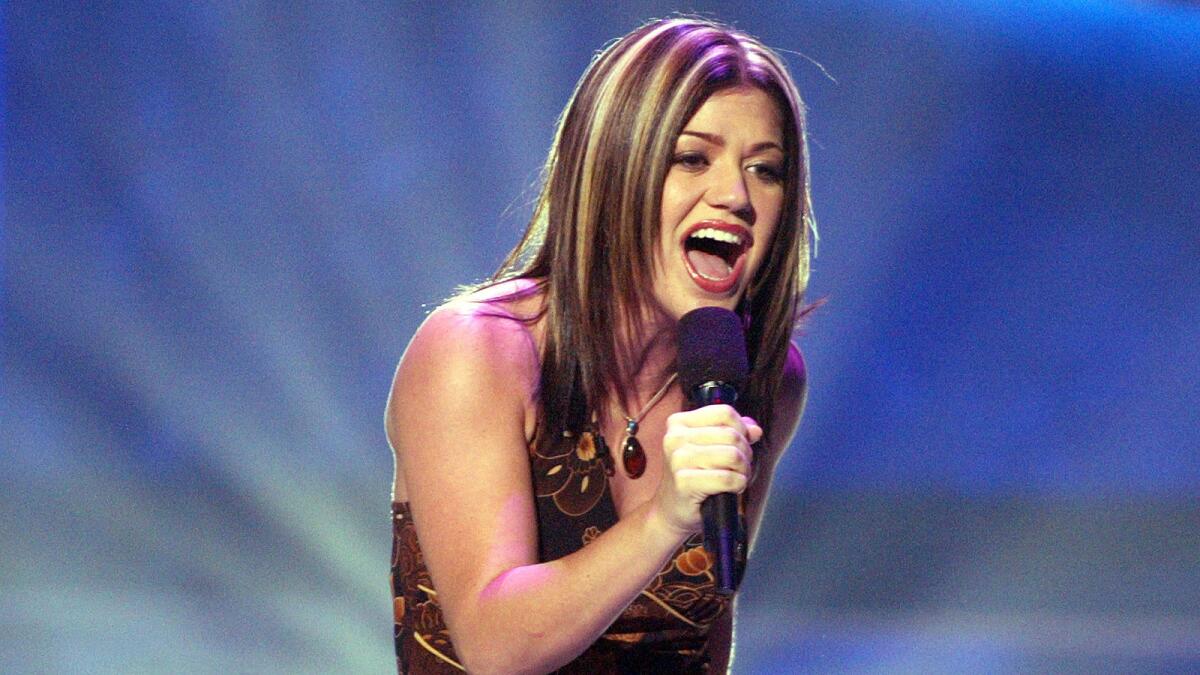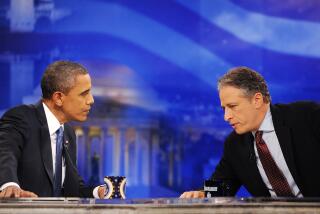‘American Idol’ was a game-changer in television and beyond

Kelly Clarkson started it all off.
Many television shows have changed something — the nature of comedy, the fate of a network, certain cultural attitudes, the industry pay scale, public tolerance of graphic imagery, the sophistication of storytelling or just far too many women’s hairstyles.
Only one changed everything: “American Idol.”
It may be difficult to remember amid the limp ratings and hollow hype of this 15th and final season. But 14 years ago, when Fox debuted the American version of a British singing competition, the success of “American Idol” was so big, so immediate and so utterly unexpected that it essentially broke television.
See more of Entertainment’s top stories on Facebook >>
Pretty much everything that’s happened since, from “Keeping Up With the Kardashians” to “Transparent,” from Sundance Channel’s artisanal content to Netflix’s binge model, is, at least in part, a product of the “American Idol” aftershock.
The ruthless rise of reality programming, as everyone scrambled to create the next “Idol,” all but destroyed the industry’s traditional business model, which, in turn, created a space into which new purveyors of scripted television could step without the support of enormous audiences.
“Idol’s” reliance on real-time participation ignited a frenzy of fan culture and real-time hashtag viewing that put television back into the center of the cultural discourse (if only, initially, to figure out why so many people loved “American Idol” so much) and fostered an increasingly intimate relationship between those who created TV and those who watched it.
The blatant resurrection of Hollywood’s overnight-success mythology — “Kid, I’ll make you a star!” — shaped the dreams and habits of a new generation, creating along the way a whole new self-sustaining model of content creation. Like Walt Whitman selling “Leaves of Grass” on the street corner, hordes of the “undiscovered” took to YouTube, where some went viral enough to ... make their way onto television, via “Ellen” or, in the recent case of Rachel Bloom, her very own show.
Even presidential politics have been affected. During the recent campaign, there were times when the GOP debates resembled nothing so much as the strange and often non sequitur bickering of original “Idol” judges Simon Cowell, Paula Abdul and Randy Jackson.
Oh, far beyond the actual recording stars produced, “American Idol” brought music back to television and the collective consciousness to the benefit of all. No “Idol,” no “High School Musical” or “Glee.” No “High School Musical” or “Glee,” no “Bring It On: The Musical.” No “Bring It On: The Musical,” no “Hamilton.” No “Hamilton,” and, well, it’s just too ghastly to contemplate.
But “The Voice” did turn the chairs around, and that was pretty cool.
It may seem like ancient history, but when “American Idol” came on the scene, television was still television, in the traditional sense. Sure, HBO had a breakthrough hit with “The Sopranos,” but most viewers still tuned into the four big networks for a time-honored combo plate of half-hour comedies and hourlong dramas, the more successful of which drew audiences from 10 million (“Malcolm in the Middle”) to 26 million (“CSI: Crime Scene Investigation”).
See the most-read stories in Entertainment this hour >>
CBS had launched the highly successful “Survivor” two years before, with shows like “The Amazing Race” and “Fear Factor” springing up in its wake, but though growing in popularity, reality programming was still something of a novelty — “Big Brother” had made the leap, but “Keeping Up With the Kardashians” and “The Hills” were a few years away.
Given the less-than-electric impact of the recently deceased “Star Search,” there was absolutely no good reason to believe that a singing competition between unknown performers, fueled by the antics of three cartoonish judges and the phone-dialing dexterity of teenagers, would survive, much less thrive.
Which is why Fox first aired it during the dead zone of summer, the attitude of network executives in 2002 being: Who watches television during the summer?
Well, as we all know now, millions and millions of people. Who then told their friends about “American Idol,” so that when the second season premiered in January 2003, the original numbers had almost doubled. By the time the finale rolled around, more than 38 million tuned in.
The next season, it become the highest-rated show of any sort and would remain so for years.
“American Idol” was ostensibly about building stars. But no star exploded as quickly as the show itself; its success became as hot a topic as the players competing each season. Critics, bloggers and fans created a shadow industry of “Idol” watching that set the template for the near-gemological inspection television would face in the new century. The judges, with their signature tics — Simon was the mean one, Paula was the crazy one and Randy said “dog” a lot — became household names, while the career of co-host, then solo host Ryan Seacrest grew to John Galtian proportions (who was Seacrest, really, and why did he appear to have so much influence on so many?).
Teenage girls, who everyone claimed provided the show’s majority votes, suddenly became a social force to be reckoned with, even as the show took its knocks by those who dismissed all those white guys with guitars. Suddenly singing, and wanting to be a singing star, was hot like it hadn’t been since Ms. Barbra Streisand starred in a remake of “A Star Is Born.” Talent shows began cropping up again, choirs and musicals; the soundtrack of everyone’s prom was getting coverage on a weekly basis. For fans, It was a giddy time.
Television, on the other hand, was a mess. The years following 2002 were a blur of desperation, as everyone attempted to create the next “American Idol,” a show that now regularly sprawled across the Fox portion of the TV grid for hours, for days. Soon, television looked like the war of the vaudevillians, its landscape littered with singers, dancers, models, comics, designers, chefs, inventors — you name it, there was a competition for it and, like as not, a Celebrity Edition. Attempting to adjust, the Writers Guild tried, and failed, to unionize reality writers — because they were not supposed to exist, they were often paid a pittance — while previously working actors, seeing their opportunities dry up, began leaving town.
Then, in 2007, the WGA struck for better digital rights and production on what was left of scripted television — “House,” mainly, and “Grey’s Anatomy,” along with all the various law enforcement franchises — ground to a halt, and it seemed that “Idol” and “Survivor” and all their many offspring would finally swarm like ants over scripted TV’s emaciated carcass.
But times, they change, and viewers are fickle. No other reality show took off quite like “Idol” did, and aided by the now-splintered audience model, new platforms emerged with different and splendid offerings. On its best day, “Mad Men” never got the audience “American Idol” had on its worst, but AMC’s new drama, and then its sibling “Breaking Bad,” got just as many magazine covers, in part because they were so removed from reality programming, and that began to matter as much, if not more, than the big numbers.
Indeed, “American Idol’s” enormous audience was, as it turns out, among the last of its kind. Ironically, the weight of its success helped crash the system. From it emerged a new, less monolithic model in which measurements of live viewing was only one method of many.
And the show itself grew dull, as any show will after more than a dozen years. The thrill and pageantry of this final season is entirely of its own making; even the most rabid former fans sound dutiful in their farewells.
But it doesn’t matter. “American Idol” came, it sang, it conquered, and the world will never be the same again.
Twitter: @marymacTV
More to Read
The complete guide to home viewing
Get Screen Gab for everything about the TV shows and streaming movies everyone’s talking about.
You may occasionally receive promotional content from the Los Angeles Times.







